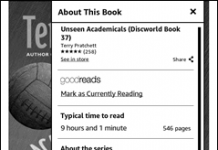 In light of the recent discussion about selling Amazon-exclusive versus cross-platform, I reached out to my friend, small-press published author Phil Geusz, to ask him about his sales experiences with Amazon versus other platforms. Geusz’s most successful novels to date have been his David Birkenhead series, a space-navall retelling of the Biblical story of King David.
In light of the recent discussion about selling Amazon-exclusive versus cross-platform, I reached out to my friend, small-press published author Phil Geusz, to ask him about his sales experiences with Amazon versus other platforms. Geusz’s most successful novels to date have been his David Birkenhead series, a space-navall retelling of the Biblical story of King David.
(I had mistakenly been under the impression that Geusz self-published, a gaffe I’ve made before with our founder David Rothman’s novel. Amazon has done so much in the way of making self-publishing feasible that it’s sometimes hard to remember there’s a level between that and the larger presses.)
Through what outlets do you self-publish your e-books?
I don’t self-publish, actually—I have several small-publishers carrying my products. I fear that I’m not skilled enough with Internet stuff to publish on my own, so it’s worthwhile to me to give up a percentage to someone who is.
I know that Amazon offers incentives, such as the Kindle Owners Library, for authors who publish exclusively through them. What made you decide to place your books with more places than just Amazon?
It never occurred to me to not publish elsewhere; I have a product, and I want it to go where the sales are. In my case the sales ended up being practically all at Amazon, but how was I to know that until I’d published in other venues?
I know Amazon has a "most favored nation" clause in self-publishing contracts, where it can adjust its prices to match prices of other stores selling the same book. Does this affect what you are able to do with your sales through other locations?
Not really. For years I’ve felt that e-book prices are set far too high, and I insist to my publishers that prices be kept low across the board. Besides, my non-Amazon sales amount to next-to-nothing. The last time I checked, the ratio between Amazon and B&N was something like 500-1 in Amazon’s favor. My stuff has been downloaded at Amazon approximately 30,000 times in the last year, the bulk of this activity being focused in one successful series. I don’t think I’ve sold twenty books, total, everywhere else on-line combined. (Two of my publishers also sell a few paper-books here and there directly at conventions—while these exceed my non-Amazon sales in volume, they’re not what’s under discussion here.) As to why this is, I have no idea. I’ve spent considerable time and energy trying to figure it out, but have gotten nowhere.
Do any of your contracts with e-book vendors (Amazon or anyone else) impose other restrictions that affect selling across multiple vendors? Are any of these restrictions particularly onerous?
I fear you’d have to ask my publishers. But I don’t hear anything along these lines from them, and I expect that if there were problems I would.
How have your Amazon sales compared to sales through other outlets?
As stated above, the ratio ridiculously favors Amazon. At one point an entire seven-book series written by me and published there was on their "Top 100 Space Opera" list, and three or four of the books were on the overall "Top 100 Science Fiction" list. One of these books topped off at #714 (iirc) in all of Amazon, though it was only that high for a day or so. Meanwhile, monthly sales elsewhere rarely leave the single digits. To put this in perspective, even after giving the publisher their cut I’ve still made $17k in the writing business in the last nine months. About $16k of that was Amazon, and of the remaining thousand about $200 was non-Amazon e-books.
What do you think is the reason for this?
I only wish I knew!
Have you given Amazon any preference in how you promote your books? (i.e. do you only mention the Amazon link, or do you regularly post links to all stores?)
It’s become obvious to me that any small-scale promotion I can do on my own is near-meaningless; what success I’ve had owes nothing to any form of promotion whatsoever. People apparently just spread the news by word-of-mouth. When I do promote, to keep things simple I just use the Amazon link. After all, that’s where all my sales are, personally at least.
Bearing in mind the sales figures, would you ever be inclined to consider going Amazon-exclusive to reap the benefits its exclusivity offers? Why or why not?
I keep hoping the other markets, especially Apple’s bookstore, will take off. I picture today’s market as "islands" of readers all divided by the device they prefer, you see. In this model, while I’ve penetrated the Kindle market I still haven’t made my mark among Nook and Apple and whatever readers. From what I’ve seen, e-book readers are very platform-loyal—I know that I am. So… No. I’m going to stick with the wider waters and hope.
Do you have any opinions about Amazon’s current domination of the e-book marketplace, or the publisher agency pricing anti-trust prosecution?
For years and years I sat and watched the world ignore the possibilities of the e-book, until Amazon finally put together a sales/hardware package in the Kindle that was commercially viable. (I ordered my first Kindle the week they came out.) So I don’t resent their market-domination as much as others might—they were the ones who took the big risk and made the crucial investments. That said… So long as the readers are incompatible with each other, the market is going to be screwy from the point of view of we authors. As I said above, instead of one homogenous reader-base there are now a series of device-loyal "islands" of readers. Each one must be won over separately.
Is there any important question I forgot to ask, what is it, and what would your answer be?
Heh! I’ll just close by saying that quality always pays off in the end. Mediocre books simply will not sell in such a competitive environment. Learn to write tight, well-structured and emotionally-powerful prose, and the checks will someday come rolling in.
































This author is trying to tell us how to do our own business. The fact is that I have always priced my ebooks low, at less than a third the print price. Yet in the last year the bulk of my sales came from Apple and Barnes & Noble, not Amazon. He is mistaken if I am going to go back to Amazon anytime soon. His case is rare, while the majority of ebook authors earn far less than he does, and at times are inconvenienced by Amazon’s price matching practices. It decides when a book will sell, not the author, and will push prices down below cost to achieve its own ends, which do not benefit the author. I don’t care about his support of Amazon, when it happens to him, he will know what I mean.